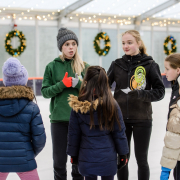Women In Sport Week: Coaching And Officiating (Part 1)
To mark Women In Sport Week (6-12 March), the Ice Skating Association of Ireland asked the women who make ice skating happen in Ireland a series of questions to hear about the challenges and unique culture of the sport within the country.
The theme for today is Coaching and Officiating. In the first of two parts, we hear from Diana Haemer who was one of a group of instructors entirely composed of women for this season’s ISAI Emerald Skate Learn To Skate classes that took place recently.
What inspired you to get involved in ice skating, and how has the sport influenced your life?
Haemer: The first time I set foot on the ice was during a friend’s birthday party at my local rink back in Virginia (USA), and I immediately loved the independence and freedom of skating. I also had the privilege of training with many internationally-competitive skaters, such as Ashley Wagner, nearly all of whom were female. Each skater takes to the ice in different way in that some people are jumpers, others love choreography, etc. Growing up as part of a large, diverse group of athletes also gave me a lot of important female role models in both coaches and fellow skaters. From them I learned how to persevere through failures as well as the importance of showing kindness in a highly-competitive environment. Their legacy is one that has continued to influence me long after my last competitive performance. Indeed, no matter how far away I am from the nearest rink I will always feel like a skater.
Women in sport have historically faced barriers to participation and recognition. Have you experienced any challenges or obstacles in ice skating in Ireland because of your gender?
Haemer: I am grateful that here in Ireland there is such a supportive and close-knit skating community. The figure skating world is predominantly female, and it can feel as though we skaters receive less attention in the Irish sporting world than athletes doing other, more rugged sports. Indeed, people often underestimate the strength a skater needs to be able to master any edge or spin, let alone doubles or triples. Skating’s beauty is often what draws people to the sport, with elegant and creative choreography connecting the deceptively difficult elements. I think the greatest barrier female figure skaters face in the Republic is not being taken seriously enough as athletes. One could argue that if we were, there would be permanent year-round training facilities.
What do you feel are the positive aspects of being a woman involved in ice skating in Ireland?
Haemer: The ice is a great space for self-expression, regardless of one’s gender identity. My friends and I enjoy challenging each other during practice and teaching each other new moves. This was also my first year coaching during our short skating season, and I loved working with an all-female coaching team to help our skaters pass through as many Emerald Skate and Freestyle levels as they could. All of my students, from age 7 to adult, came to the rink before the crack of dawn each weekend with a truly inspiring amount of motivation. A majority of them were women and girls, so it was wonderful helping to inspire this new generation of skaters to excel, even though we only had a few months together.
Representation and visibility are important issues in all areas of life, including sport. What would you like to see happen in the world of ice skating to encourage more women to participate and succeed ?
Haemer: Since women are adequately represented in the figure skating world as a whole, the next step is to increase representation within Ireland. The sport is somewhat of a mystery in people’s minds, which I understand can be isolating for Irish skaters. Some may even feel misunderstood by their peers and neighbours and can only invite them to showcases or practice sessions during the winter months. Thus in order to create a supportive environment for female figure skaters, it is necessary to increase skating’s popularity by building a permanent ice rink. This will legitimise the sport in people’s mind and make it easier for Ireland’s skaters to excel in international competition. After all, no one can participate in a sport if they do not have access to it.
